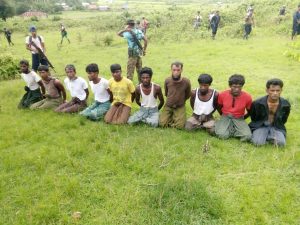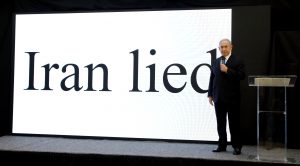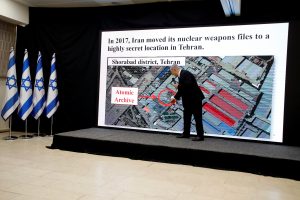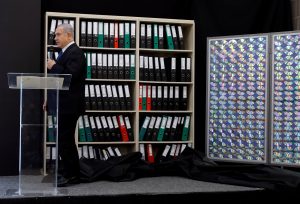
By John Chalmers
YANGON (Reuters) – Time and again, Myanmar’s government appeared at risk of blowing its prosecution of two young journalists who had exposed a massacre of 10 Muslim men and implicated security forces in the killings.
On April 20, a prosecution witness revealed in pre-trial hearings that police planted military documents on Reuters reporters Wa Lone and Kyaw Soe Oo in order to frame them for violating the country’s Official Secrets Act. That admission drew gasps from the courtroom.
A police officer told the court that he burned notes he made at the time of the reporters’ arrest but didn’t explain why. Several prosecution witnesses contradicted the police account of where the arrests took place. A police major conceded the “secret” information allegedly found on the reporters wasn’t actually a secret.
And outside the courtroom, military officials even admitted that the killings had indeed taken place.
These bombshells bolstered central assertions of the defense: The arrests were a “pre-planned and staged” effort to silence the truthful reporting of Wa Lone and Kyaw Soe Oo.
In the end, the holes in the case were not enough to stop the government from punishing the two reporters for revealing an ugly chapter in the history of Myanmar’s young democracy. On Monday, after 39 court appearances and 265 days of imprisonment, Wa Lone and Kyaw Soe Oo were found guilty of breaching the Official Secrets Act and sentenced to seven years in prison.
Yangon northern district judge Ye Lwin ruled that the two reporters had breached the secrets act when they collected and obtained confidential documents. Delivering his verdict in the small courtroom, he said it had been found that “confidential documents” discovered on the two would have been useful “to enemies of the state and terrorist organizations.”
After the verdict was delivered, Wa Lone told a cluster of friends and reporters not to worry. “We know we did nothing wrong,” he said, addressing reporters outside the courtroom. “I have no fear. I believe in justice, democracy and freedom.”
The prosecution of Wa Lone and Kyaw Soe Oo has become a landmark press freedom case in Myanmar and a test of the nation’s transition to democratic governance since decades of rule by a military junta ended in 2011. The military, though, still controls key government ministries and is guaranteed 25 percent of parliamentary seats, giving it much power in the fledgling democracy.
During the court hearings, U.N. Secretary General Antonio Guterres and leaders from several Western countries had called for the reporters’ release. After the verdict, Scot Marciel, the U.S. ambassador to Myanmar, said the ruling was “deeply troubling” for everybody who had struggled for media freedom in the country. “I’m sad for Wa Lone and Kyaw Soe Oo and their families, but also for Myanmar,” he said.
Reuters Editor-in-Chief Stephen J. Adler said the two reporters had been convicted “without any evidence of wrongdoing and in the face of compelling evidence of a police set-up.” The verdict, he said, was “a major step backward in Myanmar’s transition to democracy.”
Myanmar government spokesman Zaw Htay did not respond to requests for comment about the verdict.

FILE PHOTO: Ten Rohingya Muslim men with their hands bound kneel as members of the Myanmar security forces stand guard in Inn Din village September 2, 2017. REUTERS/File Photo
A week before the ruling, United Nations investigators said in a report that Myanmar’s military had carried out mass killings and gang rapes of Muslim Rohingya with “genocidal intent,” and that the commander-in-chief and five generals should be punished. The report also accused the government of Aung San Suu Kyi of contributing to “the commission of atrocity crimes” by failing to shield minorities from crimes against humanity and war crimes. Myanmar has rejected the findings.
Suu Kyi, the country’s de facto leader who spent some 15 years under house arrest during the junta era, has made few public statements about the case. In a rare comment in June, the Nobel Peace Prize laureate told Japanese broadcaster NHK that the reporters weren’t arrested for covering the violence in western Myanmar. “They were arrested because they broke the Official Secrets Act,” she said.
The act dates back to 1923, when Myanmar – then known as Burma – was under British rule. The charge against the reporters carried a maximum sentence of 14 years. Wa Lone and Kyaw Soe Oo were found guilty under Section 3.1 (c) of the act, which covers obtaining secret official documentation that “might be or is intended to be, directly or indirectly, useful to an enemy.”
At the time of their arrest in December, Wa Lone, now 32, and Kyaw Soe Oo, now 28, were working on a Reuters investigation into the killing of 10 Rohingya Muslim villagers during an army crackdown in Rakhine State in the west of the country. The violence has sent more than 700,000 Rohingya fleeing to Bangladesh, where they now live in vast refugee camps.
The United States has accused the government of ethnic cleansing against the Rohingya, a Muslim minority who are widely reviled in this majority-Buddhist country. Myanmar says its operations in Rakhine were a legitimate response to attacks on security forces by Rohingya insurgents.
Reuters published its investigation into the massacre on Feb. 8. An account of the killing of eight men and two high school students in September in the village of Inn Din, the report prompted international demands for a credible probe into the wider bloodshed in Rakhine.
The story and its accompanying photographs provided the first independent confirmation of what took place at Inn Din. Two of the photos obtained by the reporters show the men kneeling, in one with their hands behind their necks and in a second with their hands tied behind their backs. A third picture shows their bodies, some apparently with bullet wounds, others with gashes, in a blood-stained, shallow grave.
SLEEP DEPRIVED
The prosecution of the reporters put Aung San Suu Kyi, winner of the 1991 Nobel Peace Prize, in the glare of an uncomfortable global spotlight. Hailed as a champion of democracy for standing up to the junta, Suu Kyi was released from house arrest in 2010. Her party won a general election in 2015 and formed Myanmar’s first civilian government in more than half a century in early 2016. Her cabinet includes three generals, however; in a speech last month, she called these military men “all rather sweet.”
Earlier this year, veteran U.S. politician Bill Richardson said Suu Kyi was “furious” with him when he raised the case of the Reuters journalists with her. Richardson, a former Clinton administration cabinet member, resigned in January from an international panel set up by Myanmar to advise on the Rohingya crisis, saying the body was conducting a “whitewash” and accusing Suu Kyi of lacking “moral leadership.” Suu Kyi’s office said at the time that Richardson was “pursuing his own agenda” and had been asked to step down.
As leader of the opposition, Suu Kyi had criticized the junta’s treatment of journalists. In 2014, she reportedly described as “very excessive” a prison sentence of 10 years with hard labor handed down to four local journalists and their boss. They were found guilty of trespassing and violating the Official Secrets Act, the same law used to prosecute the Reuters reporters. “While there are claims of democratic reform, this is questionable when the rights of journalists are being controlled,” the local Irrawaddy newspaper quoted her as telling reporters in July 2014.
A government spokesman did not answer calls by Reuters seeking comment on Suu Kyi’s statement.
Wa Lone and Kyaw Soe Oo were arrested on the evening of Dec. 12. During hours of testimony in July, they described that night and the interrogations that followed. They told the court that their heads were covered with black hoods when they were transported to a police interrogation site. They testified they were deprived of sleep for three days during their grillings. At one point, Kyaw Soe Oo said, he was punished and made to kneel on the floor for at least three hours. A police witness denied that the reporters were deprived of sleep and that Kyaw Soe Oo was forced to kneel.
Describing the night of their arrest, Wa Lone said he and Kyaw Soe Oo were detained almost immediately after being handed some documents at a restaurant by a police lance corporal he had been trying to interview for the massacre story. The policeman had invited Wa Lone to meet and Kyaw Soe Oo accompanied him, Wa Lone testified.
When the two reporters exited the restaurant, they were grabbed by men in plain clothes, handcuffed and shoved into separate vehicles, they both testified. As they were driven to a police station, Wa Lone recalled in court, a man who appeared to be in charge called a senior officer and told him: “We’ve got them, sir.”
The interrogation centered on the journalists’ reporting and their discovery of the massacre, not on the allegedly secret state documents, Wa Lone told the court. One officer, he said, offered “possible negotiations” if the massacre story wasn’t published. Wa Lone said he rejected the overture.
At one point, Wa Lone testified, the police chastised him for reporting on the Rohingya. “You are both Buddhists. Why are you writing about ‘kalars’ at a time like this? They aren’t citizens,” Wa Lone recalled being told. ‘Kalar’ is a slur widely used in Myanmar to describe Muslims, especially Rohingya and people of South Asian origin.
It was two weeks from the time of their arrest before Wa Lone and Kyaw Soe Oo were allowed contact with their families and lawyers.
In late December, they were sent to Yangon’s Insein Prison, a colonial-era building that became an emblem of the former military junta’s repressive rule. For decades, dissidents were held alongside murderers, thieves and drug dealers. Suu Kyi spent a brief period there.
“I found out my cell was built in 1865. It was used for the prisoners before they were killed,” Wa Lone told a colleague before one court hearing, amused to have discovered he was living on a Victorian-era death row.
THUMBS-UP SIGN
The first hearing came on Dec. 27, which was overcast with a few specks of drizzle. Some reporters had gathered outside the courthouse before dawn in case police tried to rush through the proceedings. Many from local media wore black T-shirts in solidarity with the Reuters reporters.
Wa Lone’s wife, Pan Ei Mon, mouthed quiet prayers between interviews with journalists. Kyaw Soe Oo’s sister, Nyo Nyo Aye, kept near her side, barely speaking.
When a white Toyota police van swung into the yard, Pan Ei Mon and Nyo Nyo Aye pushed through scrambling photographers and hugged the two men as they were led into the courthouse. Within minutes, the court extended their remand for 14 days. An application for bail was refused on Feb. 1.
After that, the two reporters were put in a pick-up truck almost weekly to make the roughly half-kilometer journey to Yangon’s Northern District Court, a dilapidated two storey red-brick building. Wa Lone and Kyaw Soe Oo would arrive at court handcuffed. Holding his hands clenched and at chest-level, Wa Lone looked like a boxer entering a ring, smiling and giving a thumbs-up sign for the cameras.
If there was a break in proceedings, the men were allowed to join their families in a side room, where they were fed and hugged. Kyaw Soe Oo’s daughter, Moe Thin Wai Zan, now three, would cling to her father. From time to time, he carefully lowered his handcuffs over her head and peppered her face with kisses.
Wa Lone’s wife, Pan Ei Mon, sat as close to her husband as she could during the hearings. She gave birth to a girl, the couple’s first child, on Aug. 10.
The courtroom could hold around 40 people and was invariably packed with family, friends, reporters and foreign diplomats. Sparrows flitted through gaps above the saloon-style doors and nested in the rafters; a cat sometimes wandered through the court. From a nearby room sounded the clacking of an old-fashioned typewriter. Power cuts were routine, and during the humid summer, the room warmed quickly as the single ceiling fan slowed to a halt. In a familiar drill, a court official would hustle spectators aside to fetch a generator and lug it into a hallway, where it chugged until the session was over.
Flanked by policemen, Wa Lone would often make an impassioned statement to the media outside court after hearings. On the day the court charged the reporters, he raised his voice and spoke quickly: “For us, no matter what, we won’t retreat, give up or be shaken by this. I would like to say that injustice will never defeat us.”
Police said Wa Lone and Kyaw Soe Oo were caught in Yangon with secret information about the operations of security forces in Rakhine, the state where the Inn Din massacre took place. The reporters, they said, were detained after being searched at a traffic checkpoint by officers who didn’t know they were journalists.
But early in the proceedings, the police version of events began to fray. At a hearing on Feb. 1, a police major, who led the team of arresting officers, conceded that the information in the documents had already been published in newspaper reports. It was one of many inconsistencies to surface during testimony from the 22 witnesses called by the prosecution.
The precise location and circumstances surrounding the arrests emerged as a key point of contention in court. The police said the reporters were stopped and searched at a traffic checkpoint at the junction of Main Road No. 3 and Nilar Road by officers who were unaware they were journalists – not at a restaurant, as Wa Lone and Kyaw Soe Oo testified.
One prosecution witness, civilian official Kyaw Shein, supported the police on the location of the arrests. Then, in a moment of courtroom drama, defense lawyer Than Zaw Aung reached through the wooden bars of the witness stand and turned over Kyaw Shein’s left hand, which the witness had been glancing at while giving testimony. On it were written the words “Thet Oo Maung” – the official name of Wa Lone – and below it, “No. 3 Road and Nilar Road junction.” (It is common for people in Myanmar to use more than one name, as Wa Lone does.)
Asked if someone had told him to write down the address where police say the arrest took place, Kyaw Shein said no. He wrote on his hand because he was “forgetful,” he said.
‘ENTRAP HIM AND ARREST HIM’
On April 10, in a move that acknowledged the truth of the Reuters report on the Inn Din massacre, the army announced that seven soldiers had been sentenced to “10 years in prison with hard labor in a remote area” for participating in the killings.
Ten days later, the state’s case against Wa Lone and Kyaw Soe Oo appeared to suffer a setback when the court heard the reporters’ version of events – astonishingly, from a prosecution witness. They had in fact been arrested as they left a restaurant still holding in their hands documents they had just been given by police officers as part of a plan to ensnare them, said Captain Moe Yan Naing of the paramilitary 8th Security Police Battalion.
Before the reporters were arrested, Wa Lone had interviewed several members of Battalion 8 about the army crackdown in Rakhine. At least three police officers told him that the unit supported military operations there.
Moe Yan Naing testified that he was interviewed by Wa Lone in November, and had himself been under arrest since the night of Dec. 12. Earlier that day, he said, he had been taken to Battalion 8’s headquarters on the northern edges of Yangon. When he arrived, he said, he found himself among a group of several policemen who were believed to have given interviews to Wa Lone. They were interrogated about their interactions with the Reuters reporter.
Moe Yan Naing told the court that police Brigadier General Tin Ko Ko, who led an internal probe into what the reporters had been told, ordered an officer to arrange a meeting with Wa Lone that night and hand over “secret documents from Battalion 8.”
Brigadier General Tin Ko Ko gave the documents to a police lance corporal “and told him to give them to Wa Lone,” Moe Yan Naing testified. When Wa Lone left the restaurant, the general continued, the local police were to “entrap him and arrest him,” according to Moe Yan Naing. He told the court he witnessed Tin Ko Ko giving these orders.
“Police Brigadier General Tin Ko Ko told the police members, ‘If you don’t get Wa Lone, you will go to jail’,” Moe Yan Naing said.
“This officer spoke based on his own feelings,” police spokesman Colonel Myo Thu Soe told Reuters, referring to Moe Yan Naing.
In the days following his testimony, Moe Yan Naing’s wife and three children were evicted from police housing in the capital city of Naypyitaw, and he was sentenced to one year in prison for violating the Police Disciplinary Act by having contact with Wa Lone. The prosecution sought to have Moe Yan Naing declared an unreliable witness. Nevertheless, Judge Ye Lwin declared he was credible. The captain returned to court two weeks later – this time in shackles and wearing a dark blue prison uniform – to give further testimony.
A police lance corporal, who met the reporters in the restaurant moments before they were arrested, contradicted Moe Yan Naing’s account of a set-up operation. Naing Lin, the lance corporal, denied giving the Reuters reporters secret documents to incriminate them. He also denied calling Wa Lone to invite him to a meeting on Dec. 12. During cross-examination, though, defense lawyer Than Zaw Aung said phone records showed that Naing Lin had called the journalist three times on that day.
In the end, the defense’s ability to punch holes in the prosecution’s case proved to be insufficient ammunition. Wa Lone and Kyaw Soe Oo’s exposure of atrocities against a despised minority had put them on a collision course with Aung San Suu Kyi, the generals and their nation’s Buddhist majority.
(Edited by Peter Hirschberg and Michael Williams.)













